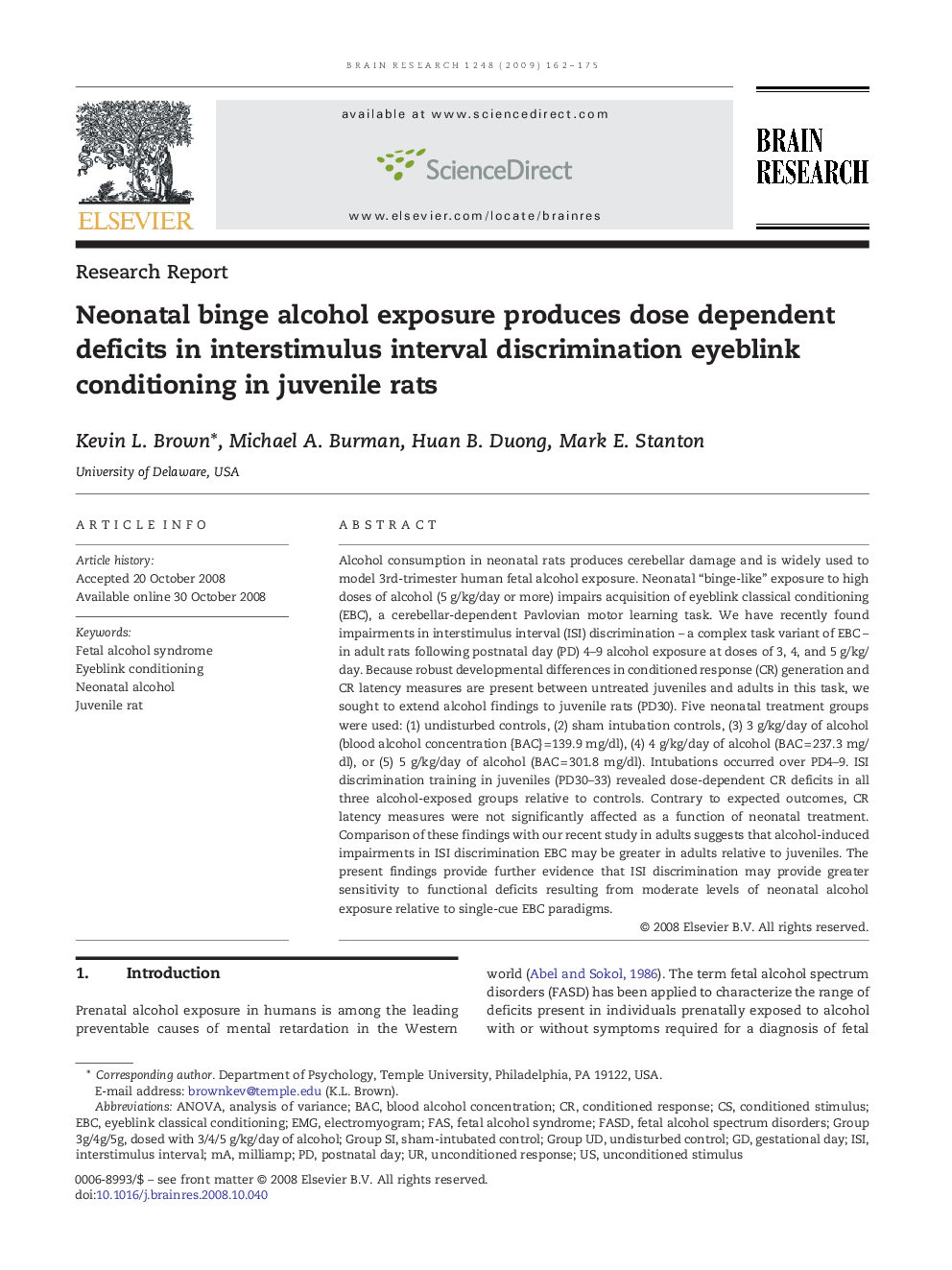| کد مقاله | کد نشریه | سال انتشار | مقاله انگلیسی | نسخه تمام متن |
|---|---|---|---|---|
| 4328799 | 1614191 | 2009 | 14 صفحه PDF | دانلود رایگان |
عنوان انگلیسی مقاله ISI
Neonatal binge alcohol exposure produces dose dependent deficits in interstimulus interval discrimination eyeblink conditioning in juvenile rats
دانلود مقاله + سفارش ترجمه
دانلود مقاله ISI انگلیسی
رایگان برای ایرانیان
کلمات کلیدی
FASEBCFASDeyeblink classical conditioningBAC - LACISI - آی اس آیFetal alcohol spectrum disorders - اختلالات طیف الکل جنینEMG - الکترومیوگرافیelectromyogram - الکترومیوگرافیanalysis of variance - تحلیل واریانسANOVA - تحلیل واریانس Analysis of varianceeyeblink conditioning - تهویه eyeblinkgestational day - روز بارداریpostnatal day - روز پس از زایمانFetal alcohol syndrome - سندرم جنینی الکلBlood alcohol concentration - غلظت الکل خونInterstimulus interval - فاصله بین فاصلهunconditioned stimulus - محرک بی قید و شرطconditioned stimulus - محرک شرطیJuvenile rat - موش نوجوانانunconditioned response - پاسخ بی قید و شرطconditioned response - پاسخ مشروط
موضوعات مرتبط
علوم زیستی و بیوفناوری
علم عصب شناسی
علوم اعصاب (عمومی)
پیش نمایش صفحه اول مقاله

چکیده انگلیسی
Alcohol consumption in neonatal rats produces cerebellar damage and is widely used to model 3rd-trimester human fetal alcohol exposure. Neonatal “binge-like” exposure to high doses of alcohol (5Â g/kg/day or more) impairs acquisition of eyeblink classical conditioning (EBC), a cerebellar-dependent Pavlovian motor learning task. We have recently found impairments in interstimulus interval (ISI) discrimination - a complex task variant of EBC - in adult rats following postnatal day (PD) 4-9 alcohol exposure at doses of 3, 4, and 5Â g/kg/day. Because robust developmental differences in conditioned response (CR) generation and CR latency measures are present between untreated juveniles and adults in this task, we sought to extend alcohol findings to juvenile rats (PD30). Five neonatal treatment groups were used: (1) undisturbed controls, (2) sham intubation controls, (3) 3Â g/kg/day of alcohol (blood alcohol concentration {BAC}Â =Â 139.9Â mg/dl), (4) 4Â g/kg/day of alcohol (BACÂ =Â 237.3Â mg/dl), or (5) 5Â g/kg/day of alcohol (BACÂ =Â 301.8Â mg/dl). Intubations occurred over PD4-9. ISI discrimination training in juveniles (PD30-33) revealed dose-dependent CR deficits in all three alcohol-exposed groups relative to controls. Contrary to expected outcomes, CR latency measures were not significantly affected as a function of neonatal treatment. Comparison of these findings with our recent study in adults suggests that alcohol-induced impairments in ISI discrimination EBC may be greater in adults relative to juveniles. The present findings provide further evidence that ISI discrimination may provide greater sensitivity to functional deficits resulting from moderate levels of neonatal alcohol exposure relative to single-cue EBC paradigms.
ناشر
Database: Elsevier - ScienceDirect (ساینس دایرکت)
Journal: Brain Research - Volume 1248, 12 January 2009, Pages 162-175
Journal: Brain Research - Volume 1248, 12 January 2009, Pages 162-175
نویسندگان
Kevin L. Brown, Michael A. Burman, Huan B. Duong, Mark E. Stanton,